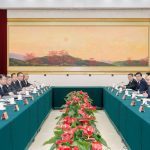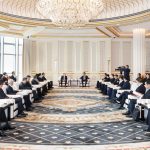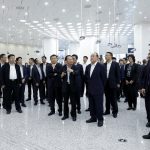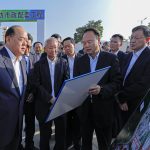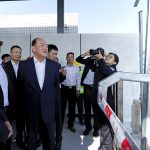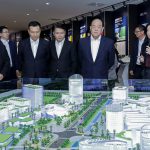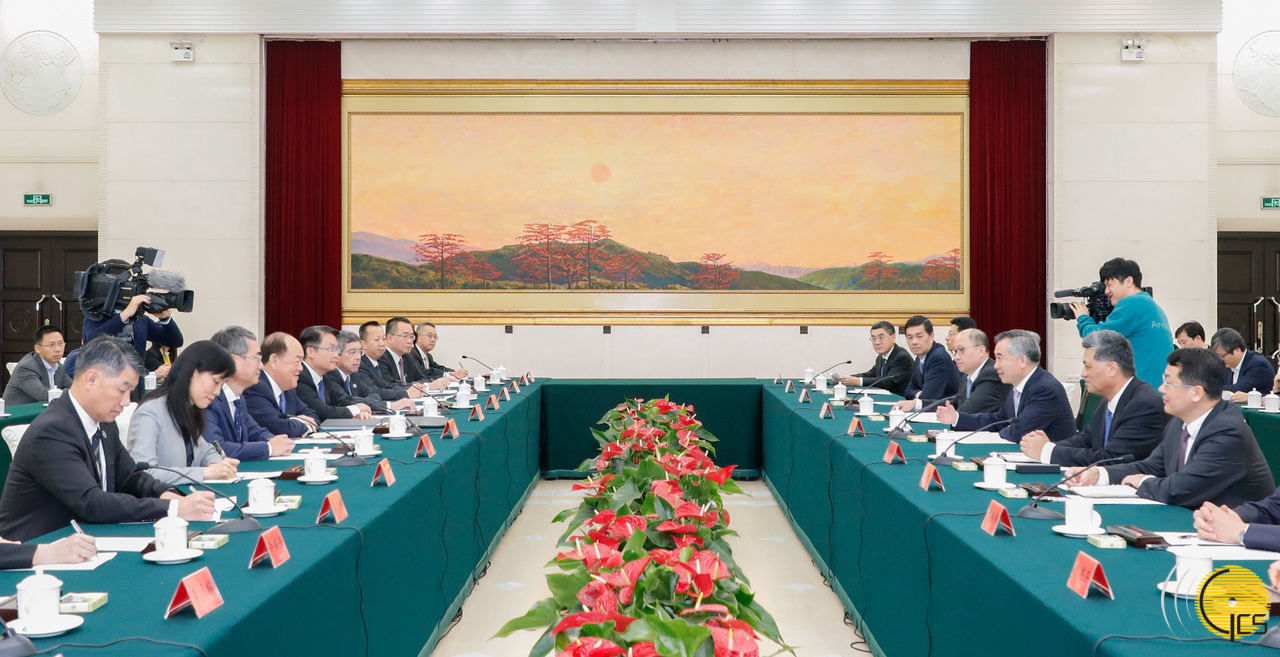 The Chief Executive, Mr Ho Iat Seng, meets with the Secretary of the CPC Guangdong Provincial Committee, Mr Li Xi, and the the Governor of Guangdong Province, Mr Ma Xingrui, in Guangzhou.
The Chief Executive, Mr Ho Iat Seng, meets with the Secretary of the CPC Guangdong Provincial Committee, Mr Li Xi, and the the Governor of Guangdong Province, Mr Ma Xingrui, in Guangzhou.
(Macao – 25 December 2019) The Chief Executive, Mr Ho Iat Seng, said yesterday (24 December) during a trip to Guangdong Province, that the reason for him leading a delegation of the new Government of the Macao Special Administrative Region (SAR) to visit Guangzhou and Zhuhai was in order comprehensively to fulfil the instructions of President Xi Jinping. Those instructions included enhancing cooperation between Guangdong and Macao, and optimising the development of Hengqin through cooperation between Zhuhai and Macao: steps that would help to broaden the scope of Macao’s long-term development, and inject new impetus into it.
During a meeting with the leading officials of the Guangdong Provincial People’s Government, Mr Ho expressed his gratitude to the Guangdong Provincial Committee of the Communist Party of China (CPC) and the Guangdong Government, for their long-term solicitude, support and assistance.
Mr Ho said that Guangdong and Macao had long maintained close connections, and Guangdong had made great contributions to Macao’s development and to Guangdong-Macao cooperation. Macao would comprehensively and correctly uphold the principle of “One country, two systems”; strictly follow the Constitution of the People’s Republic of China and the Macao Basic Law; further consolidate the working relationship between Guangdong and Macao; continue deepening pragmatic cooperation in various areas; and jointly implement the national strategy on the construction of the Guangdong-Hong Kong-Macao Greater Bay Area (Greater Bay Area); all in order to realise mutual benefits in accordance with the master plan for national development.
Mr Ho said he hoped that the leading officials of the Guangdong Government would continue to give full support to the new Macao SAR Government, to enable Macao to achieve stable, good, progress in implementing the “One country, two systems” principle.
The Secretary of the CPC Guangdong Provincial Committee, Mr Li Xi, welcomed the visiting Macao SAR Government delegation led by the Chief Executive, and briefed its members regarding the advancement of the Greater Bay Area and the new regional development plan of “One Core, One Corridor, One Zone” (one core development area, one coastal economic corridor, and one ecological development zone) promoted by Guangdong Province.
Mr Li said that President Xi, through his important speech during the celebrations of the 20th anniversary of Macao's return to the motherland and the inauguration ceremony for the Fifth-term Government of the Macao SAR, had set a clear direction for maintaining the long-term stability and prosperity of Macao, and deepening Guangdong-Macao cooperation.
The Guangdong Government would for its part: spare no effort to enhance its capabilities in relation to satisfying the needs of Macao in accordance with the request of the Central People’s Government; facilitate cooperation between Guangdong and Macao; and fulfil Guangdong’s responsibility to help Macao – in the latter’s work – regarding the development and prosperity of the whole country.
During the meeting with the leading officials of the Zhuhai Municipal People’s Government, the Chief Executive, Mr Ho, thanked Zhuhai, a close neighbour of Macao, for its long-standing support for Macao’s social and economic development. He said the new MSAR Government would diligently implement all the instructions and requirements announced by President Xi during his visit to Macao. Via greater courageousness and maintenance of innovation appropriate to the times, Macao would promote socio-economic development in various areas, and stable and long-lasting implementation of “One country, two systems”.
Mr Ho said that President Xi’s instructions highlighted the importance of the scope of Zhuhai-Macao cooperation in relation to the development of Hengqin; and the role of Hengqin in injecting new impetus into Macao’s long-term development. The Chief Executive hoped therefore that Zhuhai and Macao would: further consolidate their good working relationship; make use of their respective advantages; continue deepening cooperation in trade and investment, manpower exchanges, and social well-being and livelihoods; expedite construction of the Guangdong-Macao Industrial Park; develop further the Traditional Chinese Medicine Science and Technology Industrial Park of Co-operation Between Guangdong and Macao (GMTCM); and facilitate the construction of major infrastructure for boundary crossing points.
The Secretary of the CPC Zhuhai Municipal Committee, Mr Guo Yonghang, offered his congratulations on the formation of the new Macao SAR Government, and welcomed the delegation led by the Chief Executive. Mr Guo emphasised the fact that close cooperation between Zhuhai and Macao would lead to a bright future for both sides.
Mr Guo said Zhuhai would adhere to President Xi’s instructions to: optimise the development of Hengqin through cooperation between Zhuhai and Macao; correctly uphold the principle of “One country, two systems”; make further efforts to promote deeper and higher level of cooperation between Zhuhai and Macao; and fulfil Zhuhai’s responsibility for, and contributions to, promotion of Macao’s adequate economic diversification. It was hoped that both cities could: jointly seize this great historic opportunity; establish cooperation mechanisms and systems; expedite the development of a major platform with Hengqin as the base; and enhance infrastructure interconnections; all in order to yield fruitful results in promoting Zhuhai-Macao cooperation.
The Chief Executive led a Macao SAR Government delegation for visits and exchanges in Guangzhou on 23 December and in Zhuhai on 24 December. In Zhuhai, the delegation visited the Wanzai checkpoint, the GMTCM Park, a new residential project in Hengqin aimed at Macao people, and the new Hengqin port checkpoint.
The Government’s delegation included: the Secretary for Administration and Justice, Mr Cheong Weng Chon; the Secretary for Economy and Finance, Mr Lei Wai Nong; the Secretary for Social Affairs and Culture, Mr Ao Ieong U; the Secretary for Transport and Public Works, Mr Raimundo do Rosário; the Commissioner-General of the Unitary Police Service, Mr Leong Man Cheong; the Director-General of the Macao Customs, Mr Vong Man Chong; the Chief-of-Office of the Chief Executive's Office, Ms Hoi Lai Fong; the Director of the Government Information Bureau, Mr Chan Chi Ping; and the Director of the Protocol, Public Relations and External Affairs Office, Ms Lei Ut Mui.
Guangdong officials attending the meeting between Guangdong Provincial People’s Government and the Macao SAR Government delegation included: Deputy Secretary of the CPC Guangdong Provincial Committee and Governor of Guangdong Province, Mr Ma Xingrui; Member, Secretary-General and General Office Director of the Standing Committee of CPC Guangdong Provincial Government, Mr Zheng Yanxiong; Vice-Governor of Guangdong Province, Mr Zhang Hu; and Secretary-General and General Office Director of the Guangdong Provincial Government, Mr Liu Xiaotao.
Zhuhai officials attending the meeting between Zhuhai Municipal People’s Government and the Macao SAR Government delegation included: Deputy Secretary of the CPC Zhuhai Municipal Committee and Mayor of Zhuhai, Mr Yao Yisheng; Deputy Secretary of the CPC Zhuhai Municipal Committee, Mr Zhao Jianguo; Member of the Standing Committee of Zhuhai People's Congress and Executive Vice Mayor of Zhuhai, Mr Zeng Jinze; Member and Secretary-General of the Standing Committee of Zhuhai People's Congress, Mr Wu Shi; and Member of the Standing Committee of Zhuhai People's Congress and Head of the United Front Work Department of Zhuhai Municipal Committee, Mr Guo Caiwu.


